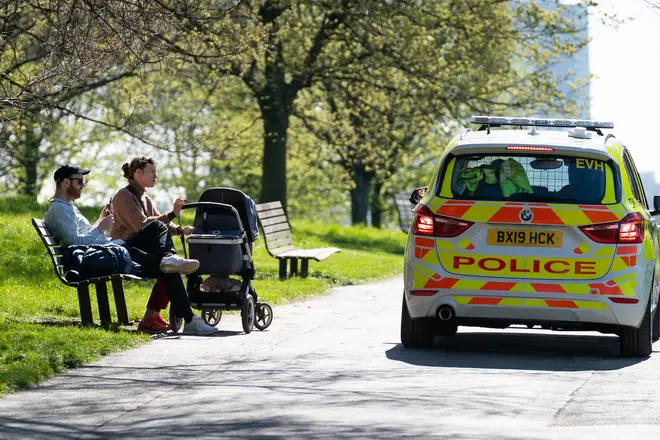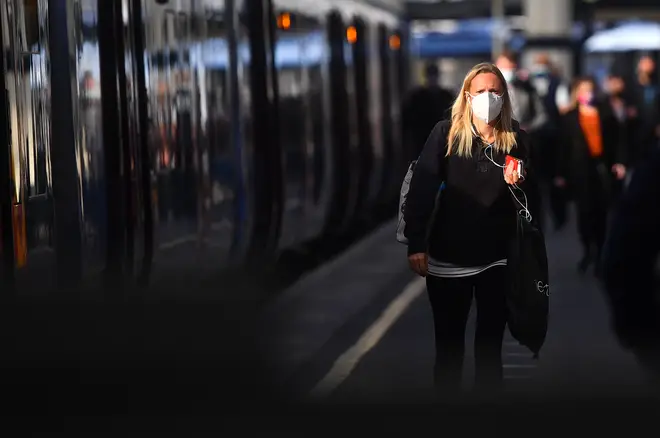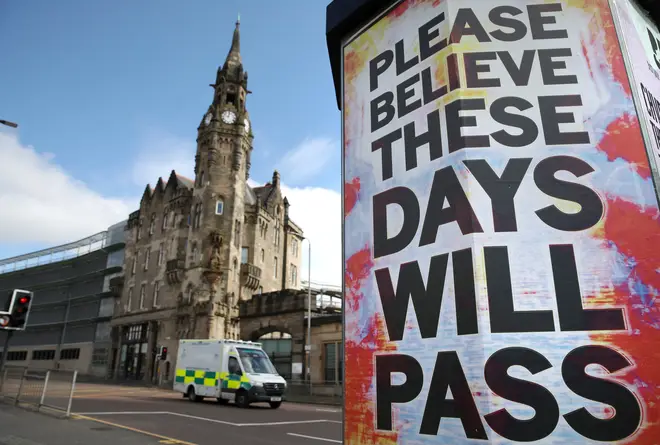
Natasha Devon 6pm - 9pm
4 November 2020, 22:53 | Updated: 5 November 2020, 11:09

Boris Johnson outlines new coronavirus lockdown restrictions
People in England have been ordered to stay at home for the next month in a bid to reverse the spread of coronavirus.
But the nation’s second national lockdown, beginning on Thursday, comes with a number of exceptions, including pupils continuing to go to school, limitless outdoor exercise and “safe visiting” for care home residents and their families.
Here are the key rules and how they will affect you.
The lockdown will run from 5 November until 2 December, after MPs voted overwhelmingly in favour of the new restrictions.
Boris Johnson has sought to reassure people the measures will be eased on 2 December as planned, and should enable shops and businesses to reopen in time for the run-up to Christmas.
But the Prime Minister acknowledged that it would depend on getting the R number – the reproduction rate of the virus – back down below 1.
The Government has published 32 pages of regulations including exceptions to the general stay-at-home message.
Specific reasons include education if it is not provided online, work if you cannot work from home (including if your job involves working in other people’s homes) and for exercise, which you can take as many times a day as you wish.

People can also leave for recreational purposes with their own household, their support bubble or on their own with one person from another household (a “one plus one” rule).
Examples of recreation include meeting up with a friend in the park for a walk or to sit on a bench and eat a sandwich. People will not be allowed to meet in homes and gardens, and golf clubs, tennis courts and gyms will be shut.
People can also leave home to shop for food and essentials, and to provide care for vulnerable people or as a volunteer.
Attending medical appointments is also allowed or to escape injury or harm (such as for people suffering domestic abuse).
Support bubbles will remain in place and people can still meet up in their bubble.
Children can move between the homes of their parents if their parents are separated.
Non-essential shops, leisure and entertainment venues must all close.
Non-essential retail includes clothing and electronics stores, car showrooms, travel agents, betting shops, auction houses, tailors, car washes, tobacco and vape shops.
Leisure includes bowling alleys, leisure centres and gyms, sports facilities including swimming pools, golf courses and driving ranges, dance studios, stables and riding centres, soft play facilities, climbing walls and climbing centres, archery and shooting ranges, water and theme parks.

Theatres, concert halls, cinemas, museums and galleries, casinos, adult gaming centres and arcades, bingo halls, zoos and other animal attractions will close.
Hair, beauty and nail salons, tattoo parlours, spas, massage parlours, body and skin piercing services, non-medical acupuncture and tanning salons will also close.
Click and collect can continue, and essential shops such as supermarkets, garden centres and shops “providing essential goods and services” will remain open.
Bars, pubs and restaurants must stay closed except for delivery or takeaway services.
They will be permitted to sell takeaway alcohol so long as it is pre-ordered online, or via phone or post.
Pre-ordered drinks can be sold to and collected by a customer “provided the purchaser does not enter inside the premises to do so”, regulations state.

Shelagh Fogarty challenges Tory MP on lockdown U-turn
Hotels, hostels and other accommodation should only open for those who have to travel for work and for a limited number of other reasons including people who need accommodation while moving house, to attend a funeral or if they are isolating themselves from others as required by law.
Schools, colleges, universities, nurseries and childcare.
The NHS and medical services such as GPs, along with Jobcentre Plus sites and courts.
People over 60 and those who are clinically vulnerable are being told to be especially careful about following the rules and minimising their contact with others.
Anyone who was formally notified that they should shield last time and not go out to work will be advised to limit their movements again.

However, formal shielding as happened during the March and April lockdown – where people were told not to leave home for any reason – will not be brought in.
People classed as clinically extremely vulnerable are being advised to work from home. If that is not possible, people may be eligible for Statutory Sick Pay or Employment Support Allowance.
More specific guidance was released on Wednesday, two days after the Government said it would be published. As expected it advises those classed as clinically extremely vulnerable to avoid all non-essential travel, including visits to any shops or to pharmacies. They should continue to attend hospital and GP appointments unless told otherwise by their doctor.
It also states that children who live with someone who is clinically extremely vulnerable, but are not clinically extremely vulnerable themselves, should still attend school.
Regulations state that it is reasonably necessary for someone to leave their home to visit a person staying in a care home if they are a member of that person’s household, a close family member or a friend.
Guidance issued by the Department of Health and Social Care lists a number of ways care homes could allow visitors, including having designated visitor pods with floor-to-ceiling screens and separate entrances.
Outdoor visits with one other person are permitted, provided the area can be accessed by the loved one without going into the main building.
Visits at windows, “where the visitor doesn’t need to come inside the care home or where the visitor remains in their car, and the resident is socially distanced” are also allowed.
Video calls between residents and family members, supported by a multimillion-pound distribution of 11,000 iPad devices to care homes, are also encouraged.
The department said plans are currently being developed to allow specific family and friends to visit care homes supported by a testing programme, although trials will not begin until later in November.

Tory MP Baker tells LBC why he voted against the government over a second Covid lockdown in England
Yes, schools, colleges and universities will all remain open. Students should not return home during term time but can return home for the Christmas holiday.
Childminders and nurseries will stay open and childcare bubbles, where for example a grandparent provides childcare while a parent works, will be able to continue.
Guidance states that while some youth services may be able to continue, such as one-to-one youth work and support groups, most youth clubs and groups will need to cease for the period of the lockdown.
Playgrounds and parks will remain open.
All students and teachers in secondary schools and colleges in England are now expected to wear face coverings in communal spaces, outside of classrooms, where social distancing cannot be maintained.
The guidance says primary school children do not need to wear face coverings, and older children and young people with special educational needs or disabilities may be exempt from wearing them, depending on their need.
Clinically extremely vulnerable staff and pupils should not come into school or college, the advice says.
Extra-curricular activities can be held before and after school, but it has to be for childcare purposes rather than simply for sports clubs.
No, you are advised not to travel unless for essential reasons.
People can travel for work and there are exemptions for overnights and second homes for work purposes.
Those who are already on holiday will be able to return to the UK.
Yes, furlough will be payable at 80% up to a maximum of £2,500 for the duration of the package of tougher national measures. The support will be available across the UK.
Business premises forced to close in England will also receive grants worth up to £3,000 per month under a Local Restrictions Support Grant.
A further £1.1 billion will be given to local authorities – distributed on the basis of £20 per head – for one-off payments to support businesses.

James O'Brien caller posits biggest mistake PM made in handling Covid
Yes. Homeowners will be able to take the option of mortgage payment holidays.
Churches will remain open for private prayer only, with Downing Street saying outlawing services inside places of worship is “vital in tackling the spread of the virus”.
Funerals will be limited to a maximum of 30 people, although it is advised that only close family members attend. Stone settings and scatterings should have no more than 15 people.
Remembrance Sunday services this year will only be permitted to take place online or outdoors.
The Government had announced that weddings and civil partnership ceremonies are only allowed in “exceptional circumstances” but regulations published on Tuesday did not explicitly state what these are.
They say it is “reasonably necessary” for a person to leave or be outside their home to attend a marriage ceremony, a civil partnership ceremony or an alternative wedding ceremony.
Gatherings of no more than six people for these purposes at a private dwelling, premises which are operated by or part of premises used for a business, a charitable, benevolent or philanthropic institution or a public body, or in a public outdoor place would be permitted under the regulations.
Listen & subscribe: Global Player | Apple Podcasts | Google Podcasts | Spotify
Yes. Boris Johnson said games would continue despite the restrictions. Elite sport can still be played but must be behind closed doors.
You must still observe the rules as they apply across England. Professor Chris Whitty said that many of the areas with lower case numbers have the highest rates of increase.
He also warned: “Some areas including the South West are likely to get pressure on beds really relatively early because of the way the NHS is constructed in those areas.”
However, the PM has said he wants to return to a tiered system after 2 December so you may have lighter restrictions than other areas from then.
Protests are not allowed but the Prime Minister’s spokesman said police and local authorities will first try to “engage, explain and encourage people to follow the rules before moving on to enforce the law”.